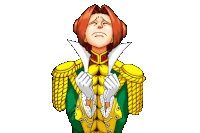Johnandsoon (talk | contribs) (→References to popular culture: Added references about Give Peace a Chance and Crazy Train.) Tags: Visual edit apiedit |
No edit summary Tags: Visual edit apiedit |
||
| Line 76: | Line 76: | ||
* During the "What I Saw, Baby" cross examination, Andistan'dhin sings, "Give Pees'lubn a chance..." This is likely a reference to the song ''[https://en.wikipedia.org/wiki/Give_Peace_a_Chance Give Peace a Chance]'' by [https://en.wikipedia.org/wiki/John_Lennon John Lennon]. |
* During the "What I Saw, Baby" cross examination, Andistan'dhin sings, "Give Pees'lubn a chance..." This is likely a reference to the song ''[https://en.wikipedia.org/wiki/Give_Peace_a_Chance Give Peace a Chance]'' by [https://en.wikipedia.org/wiki/John_Lennon John Lennon]. |
||
* When Phoenix points out that Andistan'dhin called the Magatama key the Mitamah key, Andistan'dhin says, "You're riding the crazy train to nowhere, lawyer-man!" This could be a reference to the song ''[https://en.wikipedia.org/wiki/Crazy_Train Crazy Train]'' by [https://en.wikipedia.org/wiki/Ozzy_Osbourne Ozzy Osbourne]. |
* When Phoenix points out that Andistan'dhin called the Magatama key the Mitamah key, Andistan'dhin says, "You're riding the crazy train to nowhere, lawyer-man!" This could be a reference to the song ''[https://en.wikipedia.org/wiki/Crazy_Train Crazy Train]'' by [https://en.wikipedia.org/wiki/Ozzy_Osbourne Ozzy Osbourne]. |
||
| + | |||
| + | == Notes == |
||
| + | * ''The Foreign Turnabout'' is the only introductory case to date to not start in a [[Defendant lobby|courtroom lobby]]. |
||
==Other languages== |
==Other languages== |
||
Revision as of 07:41, 27 October 2016
| This article contains information about Ace Attorney media that has been recently released and thus likely contains spoilers! | |
|---|---|
| The information in this article comes from a game, demo, or other media that has been recently released worldwide. This article may need input from an editor who has personal experience with the media in question. If you have, you can help the Ace Attorney Wiki by expanding this article. Please heed the manual of style when adding information.
Readers of this page should be aware that this article likely contains MAJOR SPOILERS concerning the media in question. You have been warned! | |
- For the demo version of this episode, see The Foreign Turnabout (demo).
| Here in Khura'in, death is not the end. Even after death, the soul lives on in the Twilight Realm... and priestesses can commune with the spirits of the dead. Fear not death. In the name of the Holy Mother... fear only the impurities of your soul. |
Episode 1: The Foreign Turnabout[1] is the first episode of Phoenix Wright: Ace Attorney: Spirit of Justice. Phoenix Wright heads to the Kingdom of Khura'in to check up on his old friend Maya Fey. While sightseeing, his tour guide, Ahlbi Ur'gaid, is arrested on suspicion of stealing the precious Founder's Orb and murdering a guard named Paht Rohl.[2]
Prologue
The kingdom of Khura'in is a peaceful country of spirit mediums and mystery located on the western edge of the Far East. However, there are currently revolutions around the kingdom, threatening to consume it whole. These actions, however, were not what Phoenix Wright had expected as he arrived in the kingdom a month prior.
April 23
Within the Tehm'pul Temple, a security guard was struck dead. His killer stood above him, realising he needed to blame someone else for his crimes, and knew exactly what to do.
Arrival

Ur'gaid meeting Wright.
At 4:26 PM, after a long plane trip, Phoenix Wright arrived in a street in the Kingdom of Khura'in. Fascinated by the culture, he took plenty of pictures. He was interrupted by a boy who introduced himself as Ahlbi Ur'gaid, a nine-year-old tour guide and monk-in-training at Tehm'pul Temple. After some chatter, Ur'gaid told Wright that his good friend, Maya Fey, couldn't see him yet, as she was still training in the mountains. Wright had come to Khura'in to celebrate the end of her ascetic training with her. He came early because he was worried about her. Ur'gaid then took Wright to Tehm'pul Temple at 4:45 PM. After a brief history lesson on the temple, Ur'gaid explained that the main "attraction" of sorts was the Dance of Devotion rite, which took place once in the morning and once in the afternoon. The Song of Ceremony was sung during the dance. Wright learned that Ur'gaid told Fey about the temple for a full hour; he pondered that maybe Fey had grown up since he last saw her. Suddenly, bells signalling the start of the Dance of Devotion rang out, and Ur'gaid rushed Wright to the temple to watch the dance, but not before giving Wright a lyrics card with an English translation.
Arrest
The Dance of Devotion began and was performed by a girl Ur'gaid referred to as "Her Benevolence". During the dance, the police suddenly barged in and arrested Ur'gaid on the charge of treason. Ur'gaid was taken into custody just as the dance came to a close.
April 24
The High Court of Khura'in

Wright arriving to Ur'gaid's trial.
Wright arrived in the accused lobby at 10:10 AM out of concern for Ur'gaid; he wanted to watch the trial. However, the bailiff resisted. After telling the bailiff he was not just a nosy foreigner, but rather, a lawyer, the bailiff was taken aback long enough for Wright to enter the courtroom. He was surprised to see Her Benevolence standing near the center of the courtroom. He heard the judge declare Ur'gaid guilty based off of something called a "Divination Séance", despite the trial having started mere moments before. The judge pointed out that séances performed by Princess Rayfa Padma Khura'in (otherwise known as Her Benevolence) are infallible, showing only the truth. Phoenix was confused by this, and wondered what Ur'gaid's attorney was doing, only to discover he didn't have an attorney. Rayfa ordered the judge to impose the highest penalty on Ur'gaid. When the judge agreed, Wright finally objected, going to the defense's bench. When asked, Wright stated he was an ordinary tourist, and nothing more, inquiring where Ur'gaid's defense attorney was. The judge explained that defense attorneys are not needed in Khura'in, as Rayfa's Divination Séances determined everything. When Wright saw how terrified Ur'gaid was, he decided to be his defense attorney, despite Ur'gaid not wanting Wright to defend him. When the judge ordered the bailiff to kick out Wright, the prosecution, Gaspen Payne, who had become Chief Prosecutor of Khura'in, objected, saying he would like to give Wright a chance and proceed with court in the manner of his previous country. Rayfa agreed, saying it could prove to be amusing, as it had been at least twenty years since a defense attorney had been present in the courtroom. Wright then notices that the gallery was saying hateful things about him and wondered why.

The photo of the treasure box.
Payne gave his opening statement; Ur'gaid had been accused of larceny and murder. He explained that the Founder's Orb, a national treasure of Khura'in in which Khura'in's Holy Mother's soul, or mitamah, is contained, was stolen from the treasure room of Tehm'pul Temple; the dead body of an armed temple security guard named Paht Rohl, who was assigned to guard the Founder's Orb, and the empty treasure box that housed the orb were both found in the treasure room. The box had been forced open and emptied. Payne presented a photo of the crime scene and asserted that Rohl was killed by the treasure thief, and also presented Rohl's autopsy report, which states that he was killed due to cerebral contusion from a head injury between 12 and 1 PM the previous day. Wright then learnt of the Founder's Orb's importance; no one outside the royal family could so much as look at the treasure itself. Payne presented an eight-year-old newspaper article containing black-and-white photos of the treasure's box, which were the only photos of it in existence. Furthermore, he explained the box only leaves the treasure room once a year for a special New Year's rite. He added that there had been a string of thefts of historic artifacts from the temple. Payne claimed that to help with his family's finances (as they were by no means wealthy), Ur'gaid worked as a tour guide in addition to his training, and had decided to steal the treasure in order to help further. Wright asked Payne what the murder weapon was; Payne explained that the empty treasure box left behind at the scene had a large bloodstain on it, making it the murder weapon. He claimed that Ur'gaid went to the treasure room to steal the treasure at the top of the altar stairs, but ran into Rohl. In order to get away with the theft, he killed Rohl and fled after forcing the box open and emptying it of its contents. Cementing Ur'gaid's guilt was the presence of a notice scroll found near the victim's body, which ordered all temple windows to be closed to prevent theft; to Wright's horror, this scroll also bore Ur'gaid's fingerprints.
The judge moved to declare his verdict, but Wright protested his right to cross-examine the defendant. To Wright's dismay, the judge did not seem aware of what a cross-examination was until reminded, and Ur'gaid expressed his distaste upon learning that Wright's profession was that of a lawyer. Ur'gaid testified that he did not go near the treasure box "with the green butterfly motif". Despite his misgivings, Wright called Ur'gaid out on this inconsistency; Ur'gaid would not have been able to identify the box's design by its color since access to it was restricted, and the photos presented earlier were in black and white.
Payne pointed out that Wright had proven nothing; the Séance still implicated Ur'gaid. The judge warned Wright that if he persisted in Ur'gaid's defense, he would suffer the consequences of the Defense Culpability Act if Ur'gaid was found guilty. Wright was not sure what this meant, to the judge's shock; the judge explained that the DC Act stated that lawyers who defended criminals would suffer the same punishment if they were found guilty. Many defense attorneys had already been executed or imprisoned as a result of this law, and Payne gloated at the chance to take revenge on Wright. Despite the odds, Wright insisted that he would defend Ur'gaid, recalling his own creed to defend those who had no one to defend them.
Rayfa added that as the High Priestess, it was up to her to interpret the indisputable sensations the victim suffered before death. She expressed certainty that Wright could not do anything about it.
Insight
Based on the visions, Rayfa claimed that Ur'gaid murdered Rohl after the morning Dance of Devotion took place. Wright studied the visions reflected in the Pool of Souls, realizing he could point out the victim's sensations if they contradicted with the evidence he had on hand, and noted that the victim had heard the Song of Ceremony at the moment of death, contradicting with Rayfa's statement. Rayfa was surprised that Wright brought up an issue with her insight, but simply explained Rohl had heard a practice run of the ceremony through the temple's loudspeakers; the loudspeakers also explained how Rohl heard the song from the treasure room, which was some distance away from where the practice was being held. She amended her Insight, claiming Ur'gaid struck Rohl over the head and caused him to black out and die from the pain of blunt force trauma.
Wright objected, pointing out that Rohl's sensation of pain was only experienced after his vision had gone black, meaning Ur'gaid had not dealt the fatal blow. Payne countered that the temple experienced a brief blackout at the time, explaining why Rohl's vision went black. However, Wright pointed out that Rohl had heard the Song of Ceremony even after his vision went black, which would not have been possible due to the blackout causing the speakers to fail.
Rayfa argued that none of the contradictions Wright pointed out mattered; Ur'gaid was clearly shown in the vision to have raised his arms, which could only be explained by him wielding the murder weapon to kill Rohl. Wright thought back to Ur'gaid's arrest, and pointed out that Ur'gaid could have raised his hands after being threatened at gun-point as he did when he was arrested; Rohl must have threatened Ur'gaid with his pistol for some reason.
Everyone was shocked at Wright for proposing another plausible interpretation of the vision. Acknowledging the possibility Wright had brought up, the judge decided that he could not hand down a verdict, much to Payne's dismay and Rayfa's outrage. The judge had Rayfa removed as she began throwing a tantrum at Wright for humiliating her.
Payne argued that Wright had not proved Ur'gaid's innocence; rather, the fact that Rohl threatened Ur'gaid with a gun proved that Ur'gaid had stolen the treasure box. Wright realized his only chance was to ask Ur'gaid for his testimony despite Ur'gaid's unwillingness to cooperate, and called Ur'gaid to the stand. Ur'gaid admitted his dislike of lawyers, but also admitted that he came to respect Wright after Wright willingly risked his life to defend him, even if it meant the possibility of execution, and so decided to testify.
Ur'gaid revealed that he had snuck to the treasure room to behold the treasure box for its beauty, despite it being forbidden and having been told by Rohl on multiple occasions not to do so. On the day of the incident, he attempted to sneak another peek but encountered Rohl on the stairway closer to the main hall where the choir was practicing. To his shock, Rohl threatened him at gunpoint and asked, "Did you steal it?" Just then, the lights went out and Ur'gaid fled under cover of darkness. Ur'gaid admitted to not testifying out of fear of incriminating himself.
Payne claimed that this testimony was damning enough to prove Ur'gaid's guilt, but Wright suggested that a third party might have killed Rohl from behind. Ur'gaid wasn't able to see if another culprit was in the hallway, but claimed that his dog Shah'do detected the presence of another person. Payne insisted that Ur'gaid was lying, revealing that he had another witness who would provide conclusive testimony against Ur'gaid.
References to previous cases
- When Shah'do pops out of Ur'gaid's bag, the judge asks Wright if he wants to cross-examine the dog, to which Wright thinks "not this time." This is a reference toTurnabout Goodbyes and Turnabout Reclaimed, where Wright had animals take the stand.
- When Payne said that he cross paths with Wright once, he refered to their meeting in Turnabout Countdown.
References to popular culture
- During the Divination Séance, the gallery cheers Rayfa on, saying "Long may you live and prosper!", to which Phoenix thinks to himself, "Hey! I want to live long and prosper too!". The phrase "live long and prosper" is the catchphrase of the Star Trek character Spock. Coincidentally, the release date of Spirit of Justice, September 8, 2016, is exactly fifty years after Star Trek first aired.
- When being questioned by Phoenix, Andistan'dhin at one point asks "Whatchoo talkin' bout, Phoenix?" This refers to the catchphrase of the character Arnold Jackson of the sitcom Diff'rent Strokes: "Whatchoo talkin' bout, Willis?"
- When Andistan'dhin and Payne reveal how the teachings of the Holy Mother spoke to them, Phoenix thinks to himself "Ladies and gentlemen, I present: Brother Dumb and Brother Dumber..." This is a reference to the movie Dumb and Dumber.
- When Andistan'dhin reveals his "rock star" persona, Phoenix thinks "And now for something completely different", a reference to the same quote from a 1971 British comedy based on Monty Python's Flying Circus.
- While Andistan'dhin is on the witness stand Phoenix thinks to himself that he doesn't know a lot about music followed by "...but I've got chills, and they're multiplying..." Those words are a reference to the lyrics of the song "You're the One That I Want" from the musical film Grease.
- At one point Andistan'dhin declares, "I ain't gonna take it! No, I ain't gonna take it!" referencing the song We're Not Gonna Take It by American band Twisted Sister.
- When Ahlbi asks Phoenix to give him the time he's been forced to waste back, Phoenix remarks to himself that he's a "lawyer, not a time lord". This is a reference to the Time Lord alien race from the British sci-fi show Doctor Who.
- When it is revealed that the Khura'in judge is unaware of what a cross examination is, Phoenix via inner monologue retorts ("A judge who doesn't know what a "cross examination" is... what fresh hell is this?"); "What fresh hell is this" is a famous quote used by early 20th century American wit and poet Dorothy Parker.
- During the "What I Saw, Baby" cross examination, Andistan'dhin sings, "Give Pees'lubn a chance..." This is likely a reference to the song Give Peace a Chance by John Lennon.
- When Phoenix points out that Andistan'dhin called the Magatama key the Mitamah key, Andistan'dhin says, "You're riding the crazy train to nowhere, lawyer-man!" This could be a reference to the song Crazy Train by Ozzy Osbourne.
Notes
- The Foreign Turnabout is the only introductory case to date to not start in a courtroom lobby.
Other languages
- Japanese - 逆転の異邦人 (Gyakuten no Ihōjin; lit. "Turnabout Foreigner")
References
- ↑ Randomkai. (2016-08-19). "PHOENIX WRIGHT: ACE ATTORNEY - SPIRIT OF JUSTICE GAMEPLAY FOOTAGE | FIRST 20 MINUTES | GAMESCOM 2016". YouTube. Retrieved on 2016-08-19.
- ↑ Sato (2016-06-14). Ace Attorney: Spirit of Justice Gets New Screenshots And Details On Its Story And E3 Demo. Siliconera. Retrieved 2016-06-14.
| "Pleeeeease! Expand meeeeee!" | |
|---|---|

|
This article is a stub or is otherwise incomplete. You can help the Ace Attorney Wiki by expanding it. |










